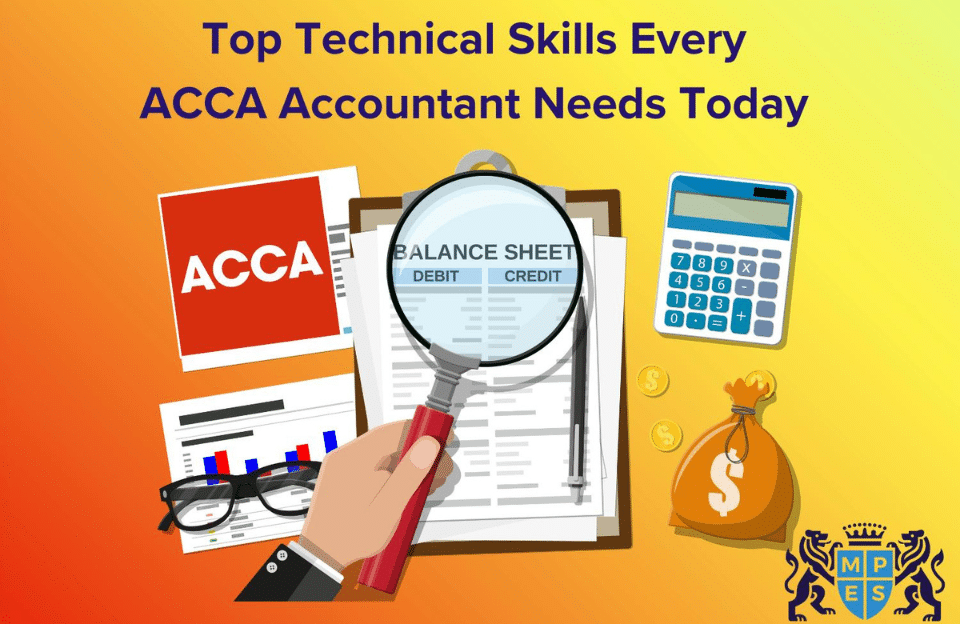Accountants are no longer just number crunchers—they’re strategic advisors, problem-solvers, and key decision-makers within organisations. As businesses continue to evolve and embrace new technologies, so too must the skills of accountants. For those pursuing ACCA Applied Skills, mastering specific technical expertise is critical for success and staying ahead in the present challenging world.
Are you equipped with the right technical Skills for Accountants to tackle the challenges ahead? In this blog, we’ll explore the top technical skills every ACCA accountant needs today to thrive in this evolving financial landscape. Let’s explore how you can elevate your accounting career!
Table of Contents
- Must-Have Technical Skills for ACCA Accountants
- Conclusion
Must-Have Technical Skills for ACCA Accountants
These abilities are vital for ACCA accountants to remain competitive and offer value in the changing financial sector. Let’s explore these essential technical abilities to improve your accounting knowledge:
1. Data Analytics
In many sectors, data analytics is transforming everything, including accounting. Accountants must be able to derive insightful information from the enormous volumes of financial data organisations compile that could guide company decisions. ACCA accountants may convert unprocessed data into helpful information using tools like Tableau or even sophisticated Excel capabilities.
Data-driven accounting improves decision-making and helps accountants be reliable consultants by interpreting data trends and creating reports. Given companies’ reliance on data for strategic planning and forecasting, it is among the most sought-after skills today.
2. Financial Modelling
Another vital skill for ACCA accountants is financial modelling. Projections and predictions enable financial models to guide companies in making wise decisions. These models depend on budgeting, valuation, mergers and acquisitions, and financial strategy development.
Employers prize the ability to create thorough, precise financial models using Excel or specialised tools. ACCA accountants who can build models to forecast future performance and propose remedial action bring tremendous value to their company. Knowing how to create and analyse these instruments is essential, whether a basic cash flow model or a more intricate discounted cash flow (DCF) model.
3. Taxation Expertise
Because of its complicated and often changing character, taxation is a subject that requires constant learning. ACCA accountants must be updated with tax laws. In addition to knowledge of VAT, capital gains tax, and foreign tax issues, one must also be thoroughly aware of company and personal tax legislation.
Mastery of tax planning, compliance, and optimisation techniques will enable customers to lower their tax obligations and guarantee adherence to all legal criteria. Furthermore, UK-based accountants should be familiar with the most recent tax changes, especially regarding Brexit.
4. Advanced Excel Skills
Still, the pillar of financial reporting and analysis is Excel. Today’s ACCA accountants need excellent Excel abilities. Using pivot tables, sophisticated calculations, macros, and conditional formatting can help you speedily and effectively handle data.
Furthermore, knowing how to combine Excel with other data tools and accounting systems can help simplify procedures and improve accuracy. This mastery improves output and shows an accountant’s technical mastery in a crucial area.
5. Understanding of IFRS and GAAP
ACCA accountants must have a solid knowledge of Generally Accepted Accounting Principles or GAAP and International Financial Reporting Standards or IFRS, particularly in multinational companies. These systems guarantee uniformity, help prepare financial accounts and enable comparisons between companies worldwide.
From creating balance sheets to consolidating financial accounts, ACCA accountants must be able to apply these guidelines appropriately in many settings. Their ability to negotiate the complexity of financial reporting across several countries should also be quite important in a globalised world.
6. Cybersecurity Awareness
Cybersecurity is more crucial than ever in today’s world. Accountants have an obligation to protect private financial data from cyberattacks. To protect the data of their clients and their company, ACCA accountants must have a fundamental knowledge of cybersecurity best practices, including using encryption, safe passwords, and multi-factor authentication.
Often, accountants are the first line of protection when spotting possible hazards as the threat of cybercrime rises. Understanding cybersecurity systems helps stop data leaks and financial crime, preserving the confidence employers and clients have in accountants.
7. Automation and AI Knowledge
Automation and artificial intelligence (AI) are transforming the accounting profession. With the rise of AI-driven software that can handle repetitive tasks such as reconciliation, ACCA accountants need to understand how these technologies can be incorporated into their workflows to boost efficiency.
By embracing automation and AI, accountants can focus on more strategic tasks and advisory roles. Additionally, accountants who understand how to implement these technologies will be in high demand as firms look to stay competitive in a tech-driven world.
Conclusion
As an ACCA accountant, staying ahead requires constant learning and adaptability. Mastering technical skills like data analytics, financial modelling, and cybersecurity awareness will enhance your efficiency and increase your value in the workplace. By investing in these skills, you’ll position yourself as a forward-thinking, indispensable asset in any organisation.
Want to advance your accounting skills to the next level? Consider exploring specialised courses from MPES Learning.


